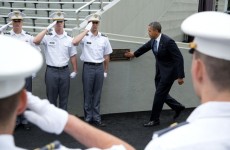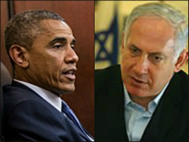Tuesday update:
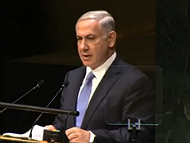
Keep your eye on the Iranian ball! Don’t win the war on ISIL and lose the war to a nuclear Iran! This was the most telling message in Prime Minister Bibi Netanyahu’s address to the UN General Assembly in New York. Obviously Israel’s leader is worried about reports the US and the rest of the 5P+1 may offer Tehran an easing of the nuclear sanctions, if the Iranians join the coalition against Islamic State. He did not pull any punches:
‘The Islamic Republic (Iran) is now trying to bamboozle its way to an agreement that will remove the sanctions it still faces, and leave it with the capacity of thousands of centrifuges to enrich uranium. This would effectively cement Iran’s place as a threshold nuclear power. In the future, at a time of its choosing, Iran, the world’s most dangerous state in the world’s most dangerous region, would obtain the world’s most dangerous weapons’.
Keep your eye on the ball; a nuclear Iran is a far greater threat than Islamic State! If you want to be fooled by the smooth-talking President Rouhani and Foreign Minister Zarif, I have no such intention.
A few lines later, Netanyahu praised US President Barack Obama for his role in disarming Syria of its chemical weapons. But reading between the lines, it was as if the Israeli leader was advising Obama:
‘Militant Islam’s ambition to dominate the world seems mad. But so too did the global ambitions of another fanatic ideology that swept to power eight decades ago. The Nazis believed in a master race. The militant Islamists believe in a master faith.’
But Iran would pose a dire threat not only to Israel; Netanyahu alluded to many leading countries in the Arab world, which were also very worried about a nuclear Iran and the militant Islamist movements gaining ground in the Sunni world. In his opinion, this new reality could lead to a rapprochement between Israel and the Arab world, which in turn could help facilitate an Israeli-Palestinian peace. Interestingly, Netanyahu was not reticent about even identifying some of them: Cairo, Amman, Abu Dhabi, Riyadh and others. (By doing so, it was a bold hint that these capitals do not have much confidence these days that the Obama administration has a serious regional policy that includes barring Tehran from getting the Bomb. If so, this would indicate they were not worried about the possibility that Israel might already posses nuclear weapons, which they apparently feel is not a threat to them). Indeed, Netanyahu raised the possibility that a rapprochement with the Arab states could facilitate a future Palestinian accord rather than the other way round.
‘The time is out of joint’
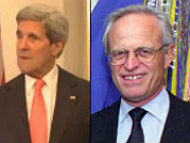
As for the question of the Palestinian peace process, Netanyahu did not see much room for progress at a time that militant Islam was on the march with Hamas also leading the band. Israel has withdrawn from two militant Islamist enclaves in southern Lebanon and Gaza, from where thousands of rockets were fired at Israel. But in an apparent reference to US Secretary of State John Kerry and his mediator Martin Indyk, who have severely criticized Israel, Netanyahu said:
‘Some don’t take Israel’s’ security concerns seriously…Israel cannot have territories from which it withdraws taken over by Muslim militants, as happened in Gaza and Lebanon. That would place the likes of ISIS within mortar range of a few miles of 80% of our population’.
‘Some don’t take Israel’s’ security concerns seriously…Israel cannot have territories from which it withdraws taken over by Muslim militants, as happened in Gaza and Lebanon. That would place the likes of ISIS within mortar range of a few miles of 80% of our population’.
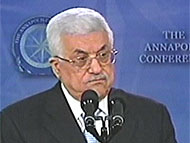
A few days ago, Palestinian President Mahmoud Abbas signaled that he was fed up with the peace talks in his repulsive harangue of Israel by accusing Israel of ‘genocide and war crimes’. Bear in mind that Abbas himself had actually blasted Hamas leader Khaled Meshaal for launching the recent fifty-day conflagration, as did Saudi King Abdullah. Both had blamed Hamas for ‘bringing death and destruction to Gaza’. Netanyahu categorically rejected the Abbas allegations by reiterating to the UN of the unprecedented steps taken by the IDF to prevent civilian casualties. The French TV coverage of two Hamas rocket launchers set up among Palestinian children highlighted how Hamas was caught in the act of exploiting civilians as human shields. On this score, the crimes perpetrated by the partners of Abbas in the national unity government were now on the head of the Palestinian President.
What happens now?

Abbas is expected to take his case to the UN Security Council for action. Israel can be expected to hunker down to see what transpires in the nuclear negotiations with Iran and whether the war of words will trigger Palestinian violence on the West Bank and in eastern Jerusalem. Back home, Netanyahu will likely spike in the opinion polls for his stirring defense of Israel, while Opposition leader Yitzhak Herzog of Labor immediately laced into the PM for not initiating a new peace offer to the Palestinians. The initial reaction of the US State Department was a little foggy if not sardonic. First spokesperson Jen Psaki noted that Washington has designated both ISIL and Hamas as terrorist organizations, but ISIL posed a different threat to Western interests and the US. And then she added:
‘I can assure everyone that an agreement reached (with Iran) would not be based on a charm offensive or how that impacts us, but on the facts and details. We’re not going to agree to a comprehensive agreement that doesn’t meet our standards and meet our threshold’.
‘We don’t believe that Prime Minister Netanyahu or anyone else from Israel suggests that the United States launch a military campaign against Hamas… but certainly we see differences in terms of the threat and otherwise (to the US)’.
IsraCast recommendation: After settling the score with Palestinian President Mahmoud Abbas for his outrageous ranting about an Israeli genocide in Gaza, Netanyahu should offer something to Abbas and those Palestinian moderates who realize that rocketing Israel does not pay. For example, an Israeli commitment not to build new housing units beyond the settlement blocs, which, it is assumed, will remain inside the Israeli borders in a final peace treaty. This would also serve Netanyahu’s declared goal of promoting relations with the Arab countries. If it is true that these long-time American allies are disillusioned with Obama’s foreign policy, this indeed is the time for Israel to demonstrate that the Jewish state can be a solid asset amid the turmoil and uncertainty that is sweeping the region.
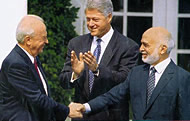
Take Jordan for example, which was once threatened by a Syrian invasion, aimed at toppling the former King Hussein. Syrian tanks were already crossing the Jordanian border when Hussein appealed for Israeli jets to warn off the Syrians, which they did at America’s request. Today, King Abdullah has ordered his army on alert to face ISIL, knowing full well that Israel has his back.
Abbas and his West Bank supporters know full well they would also be on borrowed time without an Israel serving as a bulwark to the Hamas Islamist fanatics. They are threatened just as much by Hamas as Arab leaders are by ISIL.
Ironically, this also applies to Mahmoud Abbas. If Israel had not smashed the recent Hamas plot to overthrow his Fatah regime on the West Bank, Abbas could have ended his life by being thrown off the roof of a high rise building in Ramallah, in the same manner that senior Fatah officials were in Gaza. Abbas and his West Bank supporters know full well they would also be on borrowed time without an Israel serving as a bulwark to the Hamas Islamist fanatics. They are threatened just as much by Hamas as Arab leaders are by ISIL. And despite his diatribe against Israel, Abbas, like most of the Arab states, certainly Egypt and Saudi Arabia, were rather pleased that Hamas’s military capability had taken a drubbing in the recent war sparked by the Islamists.


